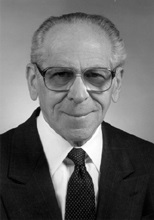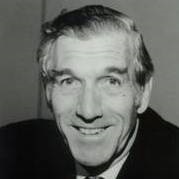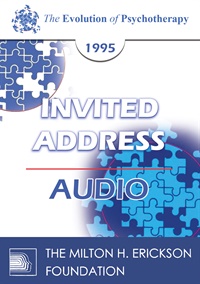EP95 Invited Address 02b - The Healing Word: Its Past, Present and Future - Thomas Szasz, MD
- Average Rating:
- Not yet rated
- Topic Areas:
- Invited Addresses | Psychotherapy
- Categories:
- Evolution of Psychotherapy | Evolution of Psychotherapy 1995
- Faculty:
- Thomas Szasz, MD | Paul Watzlawick, PhD
- Duration:
- 1:24:29
- Format:
- Audio Only
- Original Program Date:
- Dec 13, 1995
- License:
- Never Expires.
Tags: Psychotherapy Thomas Szasz
Description
Description:
Invited Address Session 2 Part 2 from the Evolution of Psychotherapy 1995 - The Healing Word: Its Past, Present and Future
Featuring Thomas Szasz, MD, with discussant Paul Watzlawick, PhD.
Moderated by Michael Munion, MA.
In the ancient world, the philosopher was a physician of the soul who, employing the healing word (iatroi /ogoi), offered counsel to persons perplexed by problems in living. After the triumph of Christianity, the priest as confessor-counselor replaced the philosopher as rhetorician of consolation. With the birth of psychiatry, and especially since the Freudian revolution, we call helping persons with words "psychotherapy." I shall try to show that without a decisive separation of rhetorical healing from medical healing, psychotherapy as the secular cure of souls is doomed to extinction.
Educational Objectives:
- To demonstrate that psychotherapy ought to be viewed as a moral-religious, rather than as a medical-therapeutic, enterprise.
- To demonstrate that the thesis that psychotherapy is inherently ineffective, as often advanced by critics, is logically incoherent.
- Given a client, articulate the impact of the economic context in which psychotherapy takes place on the ''therapeutic'' character of the enterprise itself.
*Sessions may be edited for content and to preserve confidentiality*
Credits
Faculty

Thomas Szasz, MD Related Seminars and Products
Thomas S. Szasz, (M.D., University of Cincinnati, 1944) was Professor of Psychiatry at the State University of New York, Upstate Medical Center in Syracuse. He was recipient of numerous awards, including the Humanist fo the Year Award from the American Humanist Association and the Distinguished Service Award from teh American Institute for Public Service. He has received a number of honorary doctorates and lectureships, and served on the editorial board or as consulting editor for ten journals.
Szasz has authored approximately 400 articles, book chapters, reviews, letters to the editor and columns. He has written 19 books.

Paul Watzlawick, PhD Related Seminars and Products
Paul Watzlawick, received his Ph.D. from the University of Venice in 1949. He has an Analyst's Diploma from the C.G. Jung Institute for Analytic Psychology in Zurich. Watzlawick has practiced psychotherapy for more than 30 years. He was research associate and principal investigator at the Mental Research Institute. He was Clinical Professor at the Department of Psychiatry and Behavioral Sciences, Stanford University Medical Center. Watzlawick is a noted family therapist; he is recipient of the Distinguished Achievement Award from the American Family Therapy Association. Also, he is author, co-author or editor of eight books on the topics of interactional psychotherapy, human communication and constructivist philosophy.
He formulated five axioms. They are:
- It is not possible to not communicate. Every behavior is some kind of non-verbal communication.
- Every communication has a content. In addition, there is 'metainformation', which says how the communicator wants to be understood.
- All partners involved in a communication process also interpret their own behaviour during communication.
- Human communication involves both verbal and non-verbal communication. In addition to the spoken words, there are is also a non-spoken part (gestures, behavior, intonation..) which is part of the communication.
- Communication between humans is either symmetric or complementary. This is based on whether the relationship of those communicating is based on differences or parity.


